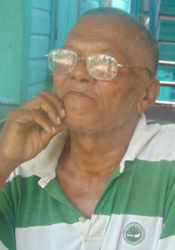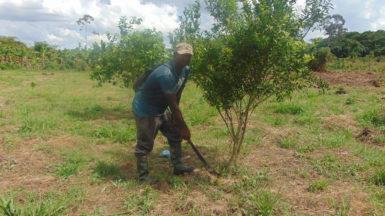The East Bank Berbice corridor is dotted with farmers who ply their trade with a sense of purpose, cognizant of the fact that while farming can be a profitable pursuit, you get out of it only as much as you put into it. For the persistent, there are promising signs and there is evidence that some of those who had given up on the pursuit are returning to the land.
The strip is still sparsely populated and it is fraught with the kinds of challenges that make farming difficult. The road is in bad shape and electricity and water are lacking. The situation provides ample evidence of just how much still needs to be done.
Germania is part of the strip; it is located 25 miles outside of New Amsterdam and that is where James Mohammed Ali or ‘Chassi’ as he is known, does his farming. He has spent his entire 70-odd years in the same place. These days, he spends his time in an odd sort of semi-retirement, catching up on old news (the newspapers arrive here the day after) and babysitting his grandchildren. He has lots of time to talk about the history of the community.

During the 1960s, Mara housed a grinding factory. Some of neighbouring villages, including Germania cultivated rice. In the late 1960s, the rice fields gave way to cattle ranching. That was not successful. Subsequently, individuals began to cultivate a range of crops including plantains, bananas, citrus and coconuts. These proved to be profitable ventures. The New Amsterdam Market has always been a good place for trading.
That is not to say that there are no challenges. Transportation is one of them. The farmers cannot afford their own and some farmers are unable to take all of their produce to the market. Spoilage has long been an occupational hazard.
Chassi seized the opportunity of a gap in the market to invest in a tractor and trailer to transport goods to the market. He has long supported his family from those earnings. Eventually, he added a bus to his possessions. It affords a greater measure of comfort to the farmers who accompany their produce to market. The bus had been put into service when the road was in reasonable condition. Now that it has deteriorated, the tractor and trailer are being pressed into service again. When the road was in fair condition, Chassi had also provided two trucks for transporting farm produce.
These days Chassi is almost entirely submerged in his life of retirement. The business has been handed over to his son who now makes the Friday treks to the New Amsterdam Market.
Chassi grew up in the business environment that had been created by his father, a farmer. His father had also established a grocery in the community. He had inherited that but when the population of Germania began to diminish about seven years ago he lost his clientele. Over time, Germania has shrunk from around 300 families to 6 families. People have moved on.
The transportation business has shrunk too. These days it has been reduced to virtually taking the family’s farm produce to market. Other villages now have their own trucking services.

Chassi would have loved to cultivate his entire 100 acres of farmland. A scarcity of farm hands means that his cultivation is confined to around 20 acres. Market prices impact heavily on the farming operation. When there is little money to be made at the prices being offered in the market there is no incentive to reap all of the produce. Some of it is simply left where it grew. Currently, oranges are a good example. You can get 100 oranges for $2,000 at New Amsterdam market. It would probably cost around $3,000 to reap that amount.
From the perspective of Germania, farming is not all that it seems. It is a reasonable business option but there does not appear to be a sense of community here. You get a feeling that the farms would prosper much more if there were permanent communities and the farmers could depend on each other.
Chassi recalls that about five years ago, the National Drainage and Irrigation Authority (NDIA) would employ persons to weed the parapets and prune the bamboo trees that were encroaching onto the road. This provided employment for many of the young men in the villages while they were waiting to harvest their crops. When those jobs that cushioned them disappeared, the families moved out of the villages.
These days, the bamboo is left to grow out of control. The protruding plants are known to damage cars and sometimes even crack vehicle windscreens. One of Chassi’s trucks has lost a windscreen. A replacement will cost around $160,000. The family cannot afford to replace the windscreen now. Chassi wants a return of the services that used to be provided by the NDIA.
The farmers of Germania and the neighbouring communities are plagued by wild animals that destroy their crops. In Chassi’s case, he says, he had applied for a firearm licence since 1994. There has been no approval and in order to get around the problem of having his crops persistently ravaged he has to engage the services of a licensed firearm holder to help get rid of the rabbits and monkeys. Birds eat most of the fruit, making cultivation of fruit trees uneconomical.
There is also the challenge of water. About two years ago the solar panel for the pump station was removed. Water no longer comes through the taps. It is a matter, mostly, of depending on the rain, or else, on friends and relatives who bring water from Edinburgh. Otherwise, they must use water from the canal.
Nor is there any reliable electricity. Homes are powered mostly by solar panels or generators. There are other depressing indicators of a community under siege. A few years ago the Police Station was closed and the premises have been overrun by bush. The local Health Centre is in the process of sharing the same faith. Medical services can now be had from the Health Centre at Sisters Village, 11 miles from Germania.
Chassi says that the restoration of reliable roads, water and electricity requires intervention. He believes that given help with critical infrastructure Germania can thrive again.
At the nearby farming community of Weglegegen, Deodat Persaud is feeling the pinch too. It is the same story; deficient infrastructure. Persaud has put down roots here. He isn’t going anywhere; at least so he says. He cultivates eddo, cassava, pumpkin and citrus.
Weglegegen is about 25 miles from New Amsterdam and neither his routine not his challenges are any different. He too has problems with transportation. He says he is paying too much to transport his produce to the market and he is also complaining about the condition of the roads and the electricity and the water. He, too, would like to be able to recruit a better crew of labourers. All of that, however, is not possible, at least not in the short term, and while you can make a living from farming in this relatively quiet community, it is not a pursuit that the faint-hearted are likely to embrace.




